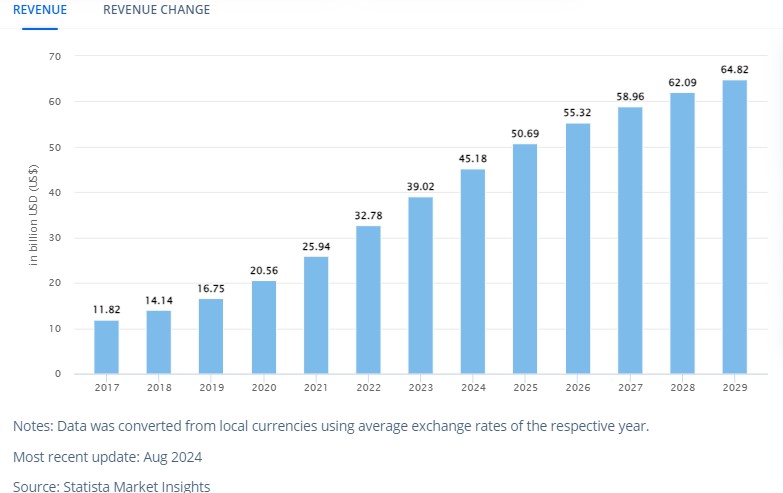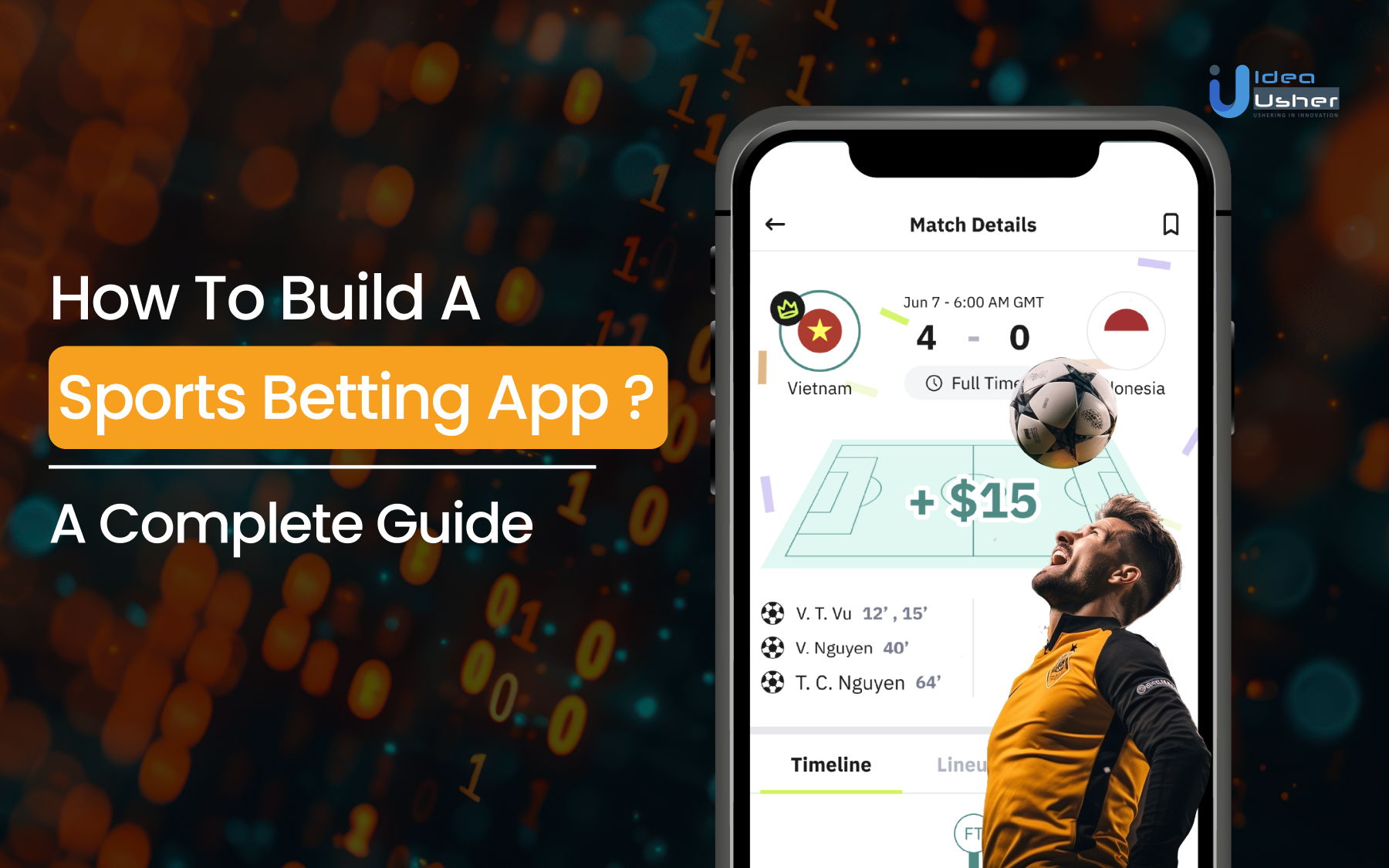A sports betting app provides the convenience of placing wagers anytime and anywhere, eliminating the need for a physical location. It also offers real-time information and updates, which empower bettors to make informed decisions. Additionally, it enhances user engagement through interactive features, bonuses, and promotions, making the betting experience more enjoyable and dynamic. This combination ultimately leads to increased user satisfaction and loyalty.
The sports betting industry is experiencing a boom, driven by technological advancements and changing regulations—projected to reach over $100 billion by 2025. As more states in the US legalize sports betting, you have a unique opportunity to tap into this profitable market. This is why understanding the essential elements for building a successful sports betting app is important, and this blog highlights everything you need to know about the app development process and business benefits.
Sports Betting App: Overview
A sports betting app allows users to place bets on various sports events through their smartphones or tablets. These apps offer convenience, flexibility, and a range of features that enhance the betting experience.
Sports betting apps cater to various users, from experienced bettors who understand betting strategies and odds to casual fans who place occasional bets for added excitement. Young adults, typically between 21 and 34, are a key demographic attracted by the convenience of mobile betting. Gambling enthusiasts are also the ones who explore diverse betting options, while tech-savvy users appreciate the seamless, intuitive experience these apps provide, enabling them to place bets easily and manage their accounts efficiently.
Here are some popular Sports Betting Apps:
- Bet365: Known for its vast selection of sports and live betting options.
- William Hill: A well-established name with comprehensive betting features.
- Betway: Offers a user-friendly experience and appealing promotions.
- DraftKings: Popular in the US for both sports betting and fantasy sports.
- Caesars Sportsbook: Renowned for its live betting and easy-to-use interface.
What Makes The Sports Betting App Unique?
Here are some key features that make sports betting apps one of a kind:
- Live Betting: Users can place bets during ongoing games with real-time odds updates.
- Pre-Match Betting: Users bet before events start, with various markets like winners, scores, and player performances.
- Variety of Markets: Includes multiple betting options like handicaps, over/under, and player stats.
- Bonuses and Promotions: Many apps provide welcome bonuses, free bets, and special promotions to attract and retain users.
- Cash Out Option: Allows users to withdraw or settle bets early, securing profits or reducing losses.
- User-Friendly Interface: Ensures easy navigation, quick access to betting options, and smooth account management.
How Does Sports Betting App Work?
A sports betting app offers a simple and convenient way for users to place bets on sports events. Here’s a simple breakdown:
- Sign Up & Verify: Users start by creating an account on the sports betting app. After signing up, they need to verify their identity and comply with gambling laws.
- Deposit Funds: Once verified, users can add money to their accounts by linking a payment method. Many apps also offer welcome bonuses for first-time deposits, making it easy for users to start placing bets immediately.
- Browse Events & Odds: After funding their accounts, users can explore various sports events that are available for betting. The app shows ongoing and upcoming matches along with the odds for different betting options.
- Select & Place Bets: Users can pick their desired bet types, such as moneyline or point spread. They can review their choices in a virtual bet slip and confirm their bets. Once confirmed, the amount is deducted from their balance.
- Live Betting & Updates: Many apps allow users to place bets during live matches. Users receive real-time updates on scores, odds, and player stats, enabling them to make quick decisions as the game unfolds.
- Cash Out or Settle Bets: After the event ends, users can either wait for the results or use the cash-out option to settle their bets early. This feature lets them lock in profits or minimize losses before the event concludes.
- Withdraw Funds: Users can withdraw their winnings by transferring funds to their linked payment methods. This process is typically straightforward, allowing users to access their money quickly after winning.
Key Market Takeaways For Sports Betting Apps
The global sports betting market is expected to reach USD 162.92 Billion by 2033. This growth is mainly driven by changing regulations in the gambling industry, increased access through connected devices, and improved digital infrastructure. These factors are making sports betting more appealing to a wider audience.

1. Online Sports Betting Projections
The online sports betting sector is expected to reach a revenue of USD 45.18 billion by the end of 2024. It is predicted to grow at an annual rate of 7.49% from 2024 to 2029, leading to a market volume of USD 64.82 billion by 2029. This growth indicates a strong interest in online betting as more people prefer digital platforms.
2. User Demographics And Engagement
By 2029, the number of online sports betting users is projected to hit around 181.3 million. User penetration is expected to increase from 3.8% in 2024 to 4.8% by 2029, showing a steady rise in interest and participation in sports betting worldwide.
3. Average Revenue per User
The ARPU in online sports betting is estimated to be USD 0.33k. This figure is important for betting companies as it shows how much money they can make from each user. As more users join, the overall revenue potential increases, making ARPU a key measure of market success.
4. Regional Insights
In terms of revenue, the United States is expected to lead the online sports betting market, projected to generate USD 14.3 billion in 2024. This growth is largely due to recent changes in laws that have allowed sports betting in many states. Canada has the highest user penetration rate at 48.8%, reflecting strong enthusiasm for sports betting among Canadians.
How Profitable Are Sports Betting Apps?
Sports betting apps can be very profitable due to several income sources and a growing number of users. Understanding how these apps make money helps to see why they are successful.
Key Revenue Streams
- Betting Commissions: Apps typically take a commission of 5% to 10% on every bet placed. This commission is a primary income source for the platforms.
- Fees and Charges: Additional fees for services like deposits and withdrawals also contribute to their revenue. These fees can add up quickly, boosting overall profits.
- Advertising Revenue: Many apps earn money by displaying ads within their platforms. This includes promotions from other companies, which generates extra income.
- Affiliate Partnerships: Some apps make money by referring users to other betting services. They earn commissions for every user they direct to these sites.
- Data Sales: Selling anonymized data to third parties, such as sports analysts or media companies, provides another revenue stream. This data can be valuable for market research and insights.
Market Growth Potential
- The global sports betting market is expected to reach USD 64.82 billion by 2029. This growth is driven by more people using online betting services.
- An estimated 181.3 million users are expected to engage with sports betting apps by 2029. This increasing user base presents significant opportunities for growth and higher profits.
Factors Enhancing Profitability
- User Engagement: Many apps keep users engaged with promotions and a wide variety of betting options. Higher engagement often leads to more bets being placed.
- Market Expansion: Companies are expanding into new regions and markets to attract more users. This strategy helps increase their audience and revenue.
- Technological Innovation: Advanced technology improves the user experience. Better features can lead to higher user satisfaction and increased betting activity.
Examples Of Successful Apps
- FanDuel: As a major player in the US sports betting market, FanDuel offers a range of betting options, including daily fantasy sports. Its growth in revenue and user base can be attributed to its intuitive interface and attractive promotional offers.
- Bet365: Bet365 is one of the largest sports betting platforms globally, earning substantial revenue through its vast user base and diverse betting markets. Its strong brand presence contributes significantly to its profitability.
- DraftKings: Known for its daily fantasy sports and sportsbook offerings, DraftKings has experienced remarkable growth and profitability. Its innovative features and engaging marketing strategies attract a large audience.
Business And Revenue Model Of Sports Betting App
Sports betting apps operate on a well-structured business and revenue model that drives profitability.
1. Business Model
- Focuses on user acquisition and retention.
- Utilizes marketing campaigns, sign-up bonuses, and partnerships.
- Emphasizes user engagement through an intuitive app interface.
- Implements loyalty programs to reward consistent betting.
- Relies on a solid technological infrastructure for real-time updates.
- Ensures compliance with gambling regulations and security measures to build trust.
2. Revenue Model
- Generates income primarily from betting commissions (5% to 10% per bet).
- Uses a freemium model for basic and premium features.
- Offers subscription plans with tiered access to various features.
- Provides in-app purchases for additional functionalities.
- Earns revenue through advertising partnerships and sponsorships.
- Utilizes affiliate programs to incentivize user referrals.
- Engages in data monetization by selling anonymized betting information.
10 Must-have Features Of A Sports Betting App
A successful sports betting app should offer features that make the betting experience smooth and enjoyable. Here are ten important features every sports betting app should include, along with real-world examples that show how they work effectively.
1. Easy-to-Use Interface
A simple and clear interface is essential for any sports betting app. Users should be able to find their way around the app without confusion, making it easy to place bets quickly.
Example: BetMGM features an easy-to-navigate design, allowing users to quickly locate their favorite sports and betting options. Its clean layout is inviting for both beginners and experienced bettors.
2. Live Betting Options
The ability to place bets during live matches adds excitement. Users can make quick decisions based on what’s happening in real-time.
Example: Caesars Sportsbook offers excellent live betting opportunities. Users can place bets while the game is ongoing, making adjustments based on how the match unfolds, which keeps them engaged.
3. Fast Deposit And Withdrawal Methods
Quick and secure payment options are key for user satisfaction. A good betting app should allow users to deposit money and withdraw winnings easily.
Example: FanDuel supports various payment methods, including credit cards and PayPal, with fast transaction times. This convenience builds trust and encourages users to engage with the app more frequently.
4. Cash-out Feature
A cash-out option allows users to withdraw their bets before an event finishes. This gives them the chance to lock in profits or limit losses based on the game’s progress.
Example: Betway provides a flexible cash-out feature, allowing users to withdraw their bets if they feel confident about their chances or want to play it safe. This feature adds to the excitement of betting.
5. Responsible Gambling Features
It’s essential for betting apps to promote responsible gambling. These tools help users manage their betting behavior and ensure they stay safe.
Example: Paddy Power includes features like deposit limits and self-exclusion options. These tools help users stay in control and enjoy betting without risking too much.
6. In-depth Statistics And Analytics
Having access to detailed stats and analytics helps users make informed betting decisions. Good apps provide insights into teams and player performances.
Example: ESPN Bet offers extensive statistics for different sports, allowing users to analyze teams and players. This information helps bettors make smarter choices and increases their chances of winning.
7. Variety Of Betting Options
Providing different types of bets, such as accumulators and proposition bets, can attract a wider audience and keep users interested.
Example: Betfair offers a wide range of betting options, including unique types like exchanges and multi-bets. This variety appeals to all kinds of bettors, from beginners to experts.
8. Betting Tools And Calculators
Having tools that help users calculate odds and potential payouts makes betting easier and more strategic.
Example: 888sport includes handy calculators for odds and payouts. These tools help users make more informed bets, improving their overall betting experience.
9. Community Features
Building a community around betting can enhance user experience. Apps that offer forums or social features allow users to connect, share tips, and learn from each other.
Example: Betfair Exchange promotes community engagement through its forums, where users can discuss strategies and share insights. This interaction helps bettors learn and grow together.
10. Wide Range Of Sports
Offering betting options for many different sports can attract diverse users and keep them engaged.
Example: Bet365 excels in providing a variety of sports, from football and basketball to niche options like esports. This extensive coverage keeps users interested and encourages them to return for different events.
Development Steps For Sports Betting App
Here are some of the essential steps you need to take when developing a successful sports betting app.
1. Market Research And Planning
First, it’s important to figure out who your users are going to be. You’ll need to understand their betting habits, the sports they like, and what they expect from a betting app. It’s also a good idea to check out other sports betting apps, see what they do well and where they’re lacking. This will help you come up with features that set your app apart. Lastly, think about how you’re going to make money from the app—whether it’s through fees, in-app purchases, or ads.
2. Real-time Data Integration
A successful sports betting app needs accurate, real-time data. To get this, you can work with data providers or sports leagues for direct updates. Once you have the data, make sure it’s cleaned and organized so users get the correct information. You’ll also need to build a system that processes this data quickly to update odds and stats as the games happen.
3. Dynamic Odds And Risk Management
Odds need to be both competitive and accurate. One way to handle this is by using machine learning to analyze historical data and current trends to set the odds. You’ll also want to put risk management measures in place to avoid big losses—like capping bet amounts or adjusting odds based on real-time game events. Offering odds that shift with the game keeps things exciting for users.
4. In-game Betting Features
Live betting is a major draw for sports betting apps. Let users place bets during the game, which keeps them engaged. You can offer options like micro-betting (betting on small events, like the next goal or play). A cash-out feature is also helpful, allowing users to pull out their bets early to lock in profits or minimize losses. Adding live streaming with interactive betting options is another way to make the app more engaging.
5. Personalized User Experience
Customizing the experience for each user will keep them coming back. You can track their favorite sports, teams, and betting patterns to offer personalized recommendations. Send notifications about events or offers that match their preferences. Allowing users to customize their dashboard with quick access to their favorite sports will make the app more user-friendly.
6. Social Interaction And Community Features
Building a social element into the app can boost engagement. Users enjoy betting in groups, challenging friends, or following others’ betting strategies. Giving them access to public betting histories or live chats lets them learn from others or discuss strategies, making the app more interactive.
7. Gamification And User Engagement
Gamification is another way to keep users engaged. You can create a system of achievements, badges, and rewards for certain actions. Leaderboards are a great way to encourage competition, as users will want to climb the rankings. Offering in-app purchases like virtual currency or unlocking premium features can also help drive engagement and generate more revenue.
8. Optimized Mobile Experience
Your app should work smoothly on both iOS and Android, so native app development for each platform is key. Push notifications can remind users about important events or betting opportunities. Offline access for certain features, like viewing past bets or stats, ensures users can stay connected with the app, even without internet access.
Tech Stack For Sports Betting App Development
Here’s the unique tech stacks required to develop a sports betting app:
| Tech Stack Component | Examples | Description |
| Frontend Frameworks | React, Vue.js, Swift, Java, Kotlin | Used to create the user interface and ensure smooth navigation. |
| Backend Technologies | Node.js, Ruby on Rails, Python (Django/Flask), Java (Spring) | Handle server-side logic, data processing, and API management. |
| Database Management | MySQL, PostgreSQL, MongoDB | Store and manage user data, betting information, and transaction records. |
| Mobile Development | React Native, Flutter | Develop cross-platform mobile apps that work on both iOS and Android devices. |
| Payment Gateways | PayPal, Stripe, Braintree | Facilitate secure and efficient financial transactions. |
| Security Measures | SSL/TLS, OAuth, Two-Factor Authentication | Ensure data protection, user authentication, and secure transactions. |
| Analytics Tools | Google Analytics, Mixpanel | Track user behavior, app performance, and betting patterns for insights. |
| Cloud Services | AWS, Google Cloud, Azure | Host the app and manage scalability, data storage, and computing resources. |
| APIs | Sports Data APIs (e.g., Sportradar, Betfair) | Provide real-time sports data, odds, and betting information. |
Some Revenue Generating Methods For Sports Betting Apps
Here are some popular methods that can generate revenue for sports betting apps:
- In-play Betting: Live betting encourages users to place multiple bets throughout a game, increasing their activity and the app’s betting volume. More frequent bets generally translate to higher revenue.
- Social Betting Features: Social interaction keeps users engaged for longer periods, leading to more bets and higher retention rates. A well-engaged community can lead to word-of-mouth growth, which indirectly boosts revenue.
- Personalized Promotions: Customized offers lead to higher user engagement. When promotions resonate with a user’s preferences, they are more likely to place additional bets or spend more frequently, contributing to higher income.
- Multi-sport Support: Offering bets across various sports attracts a wider audience, increasing the number of users and potential bets. The broader appeal can significantly raise overall betting activity, especially during different sports seasons.
- Mobile Accessibility: Making the app easy to use on mobile devices ensures users can place bets anywhere, anytime, resulting in more betting opportunities and an increase in transaction volume.
- Secure Payment Options: Multiple payment options increase user trust and convenience, which encourages more deposits and withdrawals. A smoother transaction experience leads to users engaging more with the app, thus increasing overall revenue.
- Fantasy Sports Integration: Fantasy sports leagues are often paid entry, and users are more likely to engage regularly with them. This integration adds a new layer of monetization through entry fees or premium features.
- Data Monetization: Selling anonymized user data provides a revenue stream from third-party companies like analysts, researchers, and media outlets. This creates income outside of the betting itself.
- Affiliate Programs: Referral programs help attract new users without heavy marketing spend. The cost of rewards is offset by the revenue generated from these new users, who may place bets or use premium features.
- Responsible Gambling Tools: While promoting responsible gambling doesn’t directly generate revenue, it helps retain users over the long term by building trust and reducing the risk of losing them due to harmful habits. Sustainable, long-term users contribute more to the app’s revenue compared to short-term, high-risk users.
Cost Of Developing A Sports Betting App
Here’s a breakdown of the development costs for a sports betting app:
| Phase | Description | Minimum Cost Range | Maximum Cost Range |
| Market Research | Conducting surveys, analyzing competitors, and understanding target audience | $800 | $5,000 |
| Backend Development | Building server-side logic, managing databases, and integrating APIs using Node.js or Python | $2,000 | $25,000 |
| Frontend Development | Creating the user interface using frameworks like React or Vue.js | $1,500 | $20,000 |
| App Features | Developing core features like user registration, betting options, live betting, cashout, etc. | $3,000 | $25,000 |
| Security Measures | Implementing SSL/TLS, OAuth, and other security protocols to protect user data | $900 | $8,000 |
| Testing | Conducting various tests (unit, integration, and user acceptance testing) to ensure app quality | $500 | $5,000 |
| Deployment | Setting up the app on cloud services like AWS, Google Cloud, or Azure | $500 | $2,000 |
| Maintenance and Updates | Ongoing maintenance, bug fixes, and updates to keep the app running smoothly | $800 | $10,000 |
| Total | $10,000 | $100,000 |
Factors Affecting The Development Cost Of A Sports Betting App
Developing a sports betting app involves several cost-driving factors.
- Integration with Sports Data APIs is essential for real-time odds and updates, and partnerships with third-party providers can be expensive.
- Live betting capabilities add complexity, requiring sophisticated infrastructure to ensure real-time odds adjustments.
- Cashout options also increase costs, as they require advanced backend systems to allow users to withdraw bets during live events.
- Supporting a global audience adds to expenses, especially with multi-language support, which demands additional resources.
- Regulatory compliance is crucial, as gambling laws vary by region, necessitating ongoing legal consultations and code updates.
- User verification and KYC processes ensure compliance with anti-money laundering regulations, adding to development time and cost.
- Providing customizable betting options enhances user experience but requires additional coding and design work.
- Social betting features, such as betting against friends or sharing activities, also increase development efforts.
- Integrating fantasy sports leagues demands further resources for contests and updates.
- Finally, handling large user volumes during major events requires robust servers and high-traffic management solutions to ensure app stability, significantly raising infrastructure costs.
Conclusion
Developing a sports betting app is a promising opportunity in the growing digital world. Many people are looking for easy and engaging ways to place bets, which highlights the importance of creating a user-friendly platform. Focusing on innovation and following legal guidelines can help create an app that meets the needs of users. Knowing what users want and using data effectively can lead to lasting success. With careful planning and attention to detail, a well-made sports betting app can improve user experiences and find its place in a competitive market.
Looking To Develop A Sports Betting App?
We’ve got over 10 years of experience making apps that people love. With more than 200 projects completed and 50,000 hours of coding under our belts, we know what it takes to create something special. We’ve worked on several sports betting apps, so we understand what users want and need. Let’s team up today to build an app that not only meets your goals but also stands out in the market. Reach out today to get started on your project!
Work with Ex-MAANG developers to build next-gen apps schedule your consultation now
FAQ
1. How do I create my own sports betting app?
To create a sports betting app, start by deciding what features you want. Work with skilled developers to design a user-friendly app. Make sure to follow local laws and include secure payment options. Test the app thoroughly before launching it to ensure a smooth experience for users.
2. How much does it cost to build a sports betting app?
Building a sports betting app can cost anywhere from $10,000 to over $100,000. The price depends on how complex the app is, the design, and the features you want. Consider costs for development, payment systems, and ongoing support. A good investment can lead to a successful app.
3. Is it legal to make a betting app?
Whether you can legally create a betting app depends on where you live. Many places have laws about online betting, so you may need a license to operate. Before starting, check the rules in your area to avoid legal issues later on.
4. Do betting apps make money?
Yes, betting apps can make money. They earn revenue through fees on bets, commissions, and sometimes ads. A successful app attracts many users and offers good odds, which helps keep players engaged. Good marketing and customer service also boost profits.
5. Is online sports betting profitable?
Online sports betting can be profitable, but it depends on various factors. Betting companies earn money by taking a small percentage of each bet. Some bettors can make money by betting wisely and understanding the odds. However, it’s important to bet responsibly, as losses can happen.
























